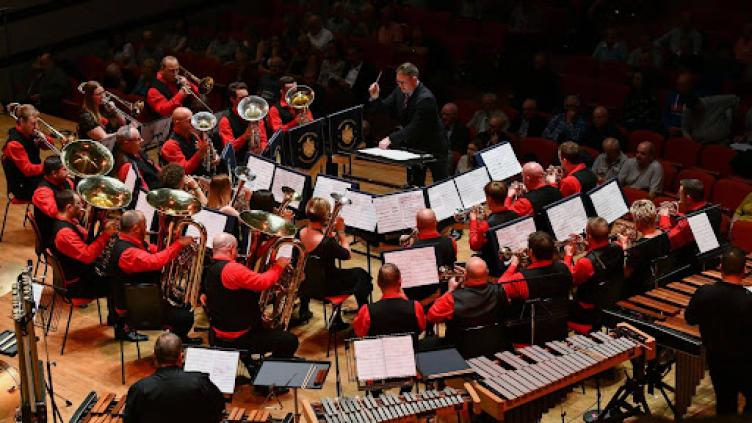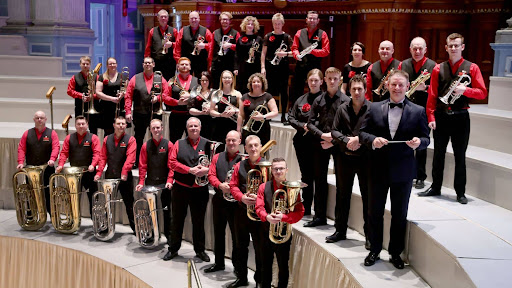You can become a member of BBE either as an organisation or as an individual

Darran West and Mike Walsh from Hammonds Band share the importance of robust safeguarding procedures and how some simple actions are helping the band to have confidence in their safeguarding practices.
What is Safeguarding?
Safeguarding is the practice of ensuring that vulnerable people have their health, wellbeing and rights protected in society. This could be in the workplace or in any other organisation with which an individual is associated, whether a paid employee or volunteer. If there are children or adults at risk (vulnerable adults) involved in your organisation, in any way, then you have a responsibility to be vigilant of potential signs of abuse and neglect. All adults could be considered to be ‘at risk’ at any point in their lives, either temporarily or permanently, due to a change of circumstance or situation. Safeguarding effects everyone, and is vital to a happy bandroom as well as the long-term health of your band.
Our responsibility
We all have a responsibility to help keep each other safe. Safeguarding protocol should be a governance priority for all workplaces, organisations and charities; it’s a fundamental part of nurturing a safe and successful environment. Bands working with children, young people and adults at risk must have safeguarding policies and procedures in place in order to respond effectively to concerns over the welfare of an individual.
Safeguarding at Hammonds
At Hammonds Band, we recently overhauled our existing safeguarding procedures, attending the NSPCC approved BandSafe training, and re-writing our policies in line with current guidance and legislation.
Whilst we don’t need to approach safeguarding in the same way that an institution like a school might, the statutory guidance document ‘Working together to safeguard children’, does apply to the voluntary and community sector, so we make sure to be up to speed with that document. What is a challenge though is that the guidance changes often - knowing how this could affect the band is vitally important, especially as any misjudgement could result in legal action.
Keeping on top of guidance is not always easy, that’s where our bi-annual BandSafe training refresher comes in. Sam Fisher, BBE’s Safeguarding Officer, keeps us informed of any updates, and helps us interpret what they will mean for our band. This annual check-in is a good opportunity to review our practices and procedures, and ask questions like “what does the legislation require us to do?”, “Is this different to what we’re doing already?” and “How should we monitor the effectiveness of any changes we put in place?”

Legal obligation to safeguard
There are other safeguarding issues (e.g. mental health, disability, etc.) which weren’t even mentioned in our previous safeguarding policy. As an organisation that greatly values equal access to our opportunities, and strives for an inclusive environment within the band, these are things that are important to us. They are also things that could affect the band legally, so our policies need to be documented.
In addition, our previous consideration for 16-18 year olds was not particularly clear. Whilst we do not have any players under 16, we do have a number in the 16-18 age range. In legal terms, these individuals are still children and should be treated as such. Our strong banding traditions of intergenerational participation are to be celebrated but not at the expense of young people’s safety and security. Taking part in the BandSafe training has provided us with some real-life examples that have given us a better understanding of possible scenarios and how to manage them.
The paperwork
We have had some form of child protection in place for a number of years. However, this relied on players in the band having DBS checks done through their own work as professionals. Plus, it only ever covered children. We now carry out our own DBS checks, via the service at Brass Bands England, which gives us much greater reassurance. These checks now cover the over 16 category too, so we are able to evidence our due diligence in all areas of safeguarding.
As we’ve already demonstrated, safeguarding is relevant and vital to the band, despite the fact that we are primarily an adult band. When we do work with children, which is at least twice a year through our concerts with the Bradford Music Service, we need to ensure we have the right permissions to do so. This is when we need to acquire a BOPA (Body of Persons Approval) - basically, a child performance licence - for each event. Whilst the licensing team at Kirklees Council are very good at dealing with bands, due to the regional contest being held at Huddersfield Town Hall, there are multiple steps involved in preparing this documentation for each concert. Being able to use the BBE BOPA will make this process infinitely easier in the future.
BBE & NSPCC’s BandSafe training
Mike Walsh, one of Hammond’s two Safeguarding Officers, took part in BandSafe training in July this year. The course itself is a very useful way to spend a few hours. Not only did the trainer put forward all the essentials of the course in a concise and easily digestible way but there was also a useful opportunity to consider potential scenarios that might arise where decisions have to be made regarding action to be taken (or otherwise), such as disclosure to the Police, Local Authorities, Safeguarding Hubs etc. and regarding practical steps that can be taken to prevent or manage difficult issues. We can definitely say that undertaking the training has given us confidence in our safeguarding processes and ability to protect children and vulnerable adults.
All in all, we found attending the course to be a benefit to the band. The initial financial outlay (£60 for BBE members) is more than compensated by the saving in time, expense and anxiety that can be involved in dealing with tricky issues that may arise. Plus, being able to advertise the fact that our organisation has these safeguarding measures in place not only reduces the risk to children and/or vulnerable adults but also makes our organisation more appealing to potential future members. It’s a win-win for Hammonds!
Who should look after safeguarding in your band?
In part, Mike decided to volunteer to do this as somebody who does not ordinarily deal with safeguarding issues, unlike Andy Griffiths, who I work alongside, who works in the education sector. I thought it might be useful for somebody without the perceived shackles and pre-conceptions of other safeguarding regimes to deal with this issue. So if you have individuals in your band with safeguarding expertise by all means take advantage of that but if you’ve no experience as yet and would like to play your part, by all means step up. The more people in the band with the appropriate training, the better.
But don’t just leave it all to your Safeguarding Officer. At Hammonds, we have recently revamped our band management structure and have taken the opportunity to look again at the sometimes seemingly complicated area of safeguarding. We’re not perfect - there are always ways in which we can improve but what we can say is that safeguarding will always be a top priority for the band, and embedded into all areas of our work.
If you’d like to learn more
For more information or advice on safeguarding, contact safeguarding@bbe.org.uk, visit the BBE Events page to book a place on a BBE BandSafe course, or join our Safeguarding Essentials drop-in on 4 October.
Contributors

Darran West is one of the band’s BBb bass players and also the band manager. This encompasses a number of duties, such as organising plans for concerts and contests, running the finances, managing our website, being the contest secretary, and a number of other smaller tasks. He is also a trustee of the band and in his ‘day job’, the head of drama, media and music at a high school near Halifax.

Mike Walsh is one of the Safeguarding Officers for Hammonds Band. He has played in the band, in its various guises, for 27 years. He is currently their Solo Baritone player and works as a solicitor, based in Leeds. Mike has been a trustee of BBE since 2017. He sees being a trustee as an opportunity to use his experience, gained both in and out of the banding arena, to make a positive contribution to the brass band community, which has played such an important part of his life.